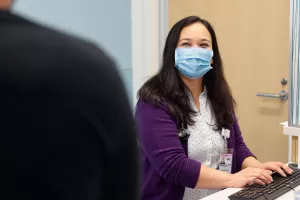When your liver is failing, a liver transplant can be life-saving. Tufts Medicine provides a streamlined 2-day evaluation to quickly begin the transplant process. Our expert transplant team offers leading-edge care and supports you through every step of your liver transplant journey, ensuring the best outcomes for your health.
Get a second chance with a liver transplant
At Tufts Medicine, we specialize in liver transplants and are here to guide you through every step with expert care. Whether you need a transplant due to a long-term liver condition or sudden liver failure, our team is committed to helping you understand your options and providing the support you need. We make sure you feel confident in your care and prepared for the next steps, every step of the way.
After your transplant, we continue to provide expert follow-up care to ensure your recovery goes smoothly. We monitor your progress, manage your medications, and support your healing to help you get back to your normal life as quickly and safely as possible. At Tufts Medicine, we’re dedicated to offering personalized, compassionate care that helps you feel confident in your journey to better health.

Conditions
If you or a loved one is facing liver disease, it's important to know that a liver transplant can be a life-saving option. Many conditions can lead to severe liver damage, and when the liver can no longer perform its necessary functions, a transplant may be the best solution.
At Tufts Medicine, we specialize in treating a wide range of liver conditions and are committed to providing you with the highest level of care and support every step of the way. Our experienced team will guide you through the transplant process, answer your questions, and make sure you feel confident and well-informed. Here are some common conditions that may lead to a liver transplant:
- Acute liver failure: Sudden loss of liver function, often due to infections or toxins (e.g., acetaminophen/Tylenol).
- Alcohol-related liver disease: Caused by long-term heavy alcohol use, leading to inflammation and scarring of the liver.
- Alpha-1 antitrypsin deficiency: An inherited disorder that can lead to liver disease and cirrhosis and may affect the lungs.
- Autoimmune hepatitis: A condition where the immune system attacks the liver, causing inflammation and liver failure.
- Bile duct cancer (cholangiocarcinoma): Cancer of the bile ducts that may require a liver transplant in some cases.
- Biliary diseases: Conditions affecting the bile ducts that may lead to liver damage or cirrhosis.
- Cirrhosis: Severe liver scarring caused by long-term liver damage; a leading cause of liver transplant.
- Colon cancer with liver metastases: When colon cancer spreads to the liver, a transplant may be considered in certain cases.
- Hemochromatosis: An inherited condition where the body stores too much iron, damaging the liver and other organs.
- Hepatitis B and hepatitis C: Chronic viral infections that can cause liver inflammation, cirrhosis or liver cancer.
- Liver cancer (hepatocellular carcinoma): A type of liver cancer that may be treated with a transplant if it’s confined to the liver.
- Metabolic dysfunction-associated steatotic liver disease (MASLD): Previously called non-alcoholic fatty liver disease (NAFLD); related to obesity and other metabolic conditions that can lead to cirrhosis.
- Polycystic liver disease: Growth of fluid-filled cysts in the liver, often tied to polycystic kidney disease.
- Primary biliary cholangitis (PBC): A chronic disease that destroys the small bile ducts, leading to cirrhosis.
- Primary sclerosing cholangitis (PSC): A long-term condition that scars and narrows the large bile ducts and is often linked to ulcerative colitis.
- Wilson disease: A rare inherited disorder causing copper buildup in the liver and other organs, which can lead to liver failure.
Supporting those in early sobriety with alcohol-related liver disease
We offer a specialized program for people with alcohol-related liver disease who are newly sober and ready to make a change. Our transplant doctors, psychiatrists and social workers work together to support your recovery and help you qualify for a transplant. This approach can shorten the time to transplant while giving you the tools and resources to protect your health long term. You’ll need a referral from your doctor to join this program, so talk with them if you’re interested.
Testing
Before a liver transplant, you'll undergo a series of tests to ensure you're ready for the procedure and to find the best donor match. At Tufts Medicine, we've streamlined the usual 6-day evaluation process into just 2 days, making it more efficient while still providing the comprehensive care you need. During these 2 days, you'll meet with different specialists and undergo necessary tests. Our team will also be available to answer any questions you have and introduce you to the professionals who will be with you throughout your journey.
Evaluation: Day 1
- Patient and family education session
- Consult with a transplant surgeon
- Consult with a transplant anesthesiologist
- Consult with a transplant nurse coordinator
- Consult with a transplant pharmacist
Evaluation: Day 2
- Consult with a transplant social worker
- Consult with a transplant infectious disease physician
- Consult with a transplant dietitian
- Consult with a transplant psychiatrist
Additional testing may be recommended based on your 2-day evaluation.
Treatments
If you have end-stage liver disease or acute liver failure, a liver transplant may be the best option. This surgery replaces your diseased liver with a healthy one from a donor. It’s a delicate procedure that requires careful planning and a skilled team to ensure the best results.
Finding a matching liver donor can be challenging because of strict compatibility requirements. At Tufts Medicine, we are accredited by the Organ Procurement and Transplantation Network (OPTN), which helps ensure fair and safe organ allocation. We also partner with United Network for Organ Sharing (UNOS), which manages transplant data across the country.
Here’s an overview of what to expect during the liver transplant process:
- Finding a liver donor: Once approved, we’ll find the best match for you. This liver will come from a donor who has passed away, following a careful and respectful donation process.
- Liver transplant surgery: The surgery removes your diseased liver and replaces it with the donor liver. This takes several hours, and you’ll be closely monitored while under anesthesia.
- Post-surgery care and recovery: After surgery, you’ll stay in the hospital for a few days. We’ll manage any pain and monitor for complications. You’ll also start taking medications to help prevent your body from rejecting the new liver.
- Follow-up care: After leaving the hospital, you’ll continue your recovery with regular check-ups. We’ll monitor your liver, adjust medications and help you stay healthy.
- Lifestyle and medication changes: You’ll need to follow a strict medication plan, including immunosuppressants to prevent rejection. A healthy diet and exercise will also help your liver heal.
At Tufts Medicine, we’re here to guide you every step of the way and help make your liver transplant journey as smooth as possible. We’ll support you through recovery and help you get back to living your life.
What to expect during a liver transplant
Liver transplant surgery usually takes 2-4 hours under general anesthesia. After surgery, you’ll stay in the hospital for about 3-5 days for monitoring. Once you leave, you’ll need regular follow-up visits to ensure your new liver is working well. Over time, these visits will become less frequent.
You’ll also need to take immunosuppressant medications to prevent rejection of the new liver. These are typically steroid-free to reduce side effects.
Expert care for your liver transplant at Tufts Medicine
At Tufts Medical Center, our experienced liver transplant team is here to support you. Led by Dr. Fredric D. Gordon and Dr. James Pomposelli, we have experts in hepatology, surgery, nutrition and more, all working together for your success. From evaluation to recovery, we provide the care and support you need every step of the way.
When you choose Tufts Medicine for your liver transplant, you’re choosing a team of highly skilled professionals committed to your success and well-being. We’ll guide you through the entire process, providing the support you need for a smoother journey toward recovery.

From regular office visits to inpatient stays, find the healthcare you need and deserve close to home.

Meet the doctors and care team devoted to supporting you every step of the way along your path to better health.